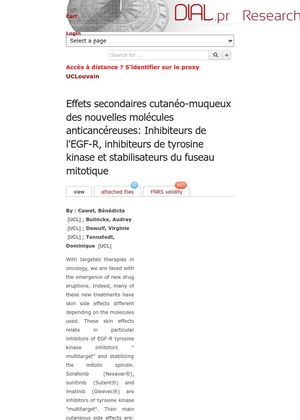Cutaneous and Mucosal Side Effects of New Anticancer Drugs: EGF-R Inhibitors, Tyrosine Kinase Inhibitors, and Mitotic Spindle Stabilizers
January 2011
EGF-R inhibitors tyrosine kinase inhibitors mitotic spindle stabilizers Sorafenib Sunitinib Imatinib hand-foot syndrome subungual haemorrhages hair texture changes hair loss erythema Cetuximab Erlotinib papulo-pustular eruptions xerosis fine hair brittle hair frizzy hair androgenetic alopecia hair color changes trichomegaly ciliary taxanes mucositis stomatitis onycholysis hyperpigmentation hypopigmentation alopecia scleroderma Nexavar Sutent Gleevec nail hemorrhages skin redness Erbitux Tarceva skin eruptions dry skin male pattern baldness long eyelashes mouth sores mouth inflammation nail separation darkened nails lightened nails hardened skin

TLDR New cancer drugs can cause skin side effects like rashes, dry skin, hair changes, and nail problems.
The 2011 study by Cawet, Bulinckx, Dewulf, and Tennstedt discussed the skin side effects of new oncology treatments, specifically inhibitors of EGF-R tyrosine kinase, "multitarget" tyrosine kinase inhibitors, and mitotic spindle stabilizers. The tyrosine kinase inhibitors Sorafenib, Sunitinib, and Imatinib were associated with side effects such as hand-foot syndrome, subungual haemorrhages, changes in hair texture, hair loss, and erythema of the face and scalp. The anti-EGF-R drugs Cetuximab and Erlotinib were linked to papulo-pustular eruptions, xerosis, fine hair, brittle and frizzy-like androgenetic alopecia, changes in hair color, and trichomegaly ciliary. Mitotic spindle stabilizers or taxanes were responsible for mucositis, stomatitis, handfoot syndrome, onycholysis, hyper-or hypopigmentation nail, alopecia, and scleroderma. The authors emphasized the importance of recognizing these symptoms early for comprehensive patient care.




